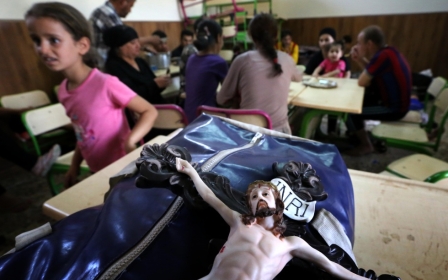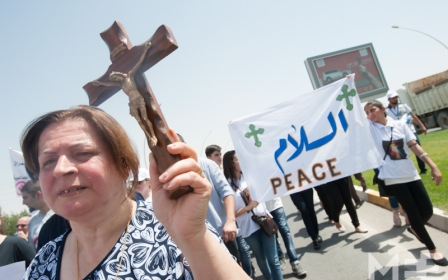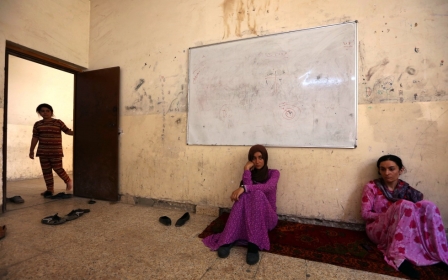Yazidi plight continues as international organisations remain on sidelines
DOHUK, IRAQI KURDISTAN – Gazal Shaybo holds her limp daughter in her arms, rocking her slightly as she clasps her unresponsive hand in her palm. Shaybo is at a loss. Her nine-year-old daughter Dalia has cerebral palsy, and is one of the thousands of Yazidis who fled their home in northern Iraq after the Islamic State (IS) tore through Sinjar, massacring hundreds. Now Shaybo and her daughter sit on an exposed concrete floor of a half-constructed building in the Kurdish city of Dohuk. Shaybo can’t get the medicine her daughter needs – even feeding her is a challenge, as water and food have become rare commodities.
Thousands of Yazidis like Shaybo and her daughter who made it out of Sinjar, through Syria and into the Kurdish autonomous region of Iraq have been met with little or no aid. In Dohuk alone upwards of 80,000 Yazidis have set up unofficial communities throughout the city and the surrounding mountains.
The streets are now spotted with half-built concrete structures now jarringly ornamented with colourful strings of clothing suspended on lines. Sunburnt faces hang out of open gaps, constructed to be the future windows of posh office buildings and hotels. The buildings are only shells, walls don’t exist and the people seeking refuge in these structures are completely exposed to the elements.
The hazardous trek from Sinjar to their new makeshift home in Dohuk has had quite a toll on Dalia, whose small body appears fragile in the weathered clothes that drape over her tiny frame. Shaybo isn’t sure what the future has in store for her and her daughter. After arriving in Dohuk, Dalia spent four days in the hospital recovering from exposure, but resources are low, hospital fees are high, and doctors told Shaybo there was little they could do for her and her frail daughter.
Abandoned by the world
The apparent attempt by the IS to ethnically cleanse Yazidis from Iraq, garnered significant attention around the world, however recently that attention has waned and almost come to a halt. Shaybo said she expected to receive help from aid agencies and international governments when they eventually made it to Dohuk – but no aid came. Like many of the Yazidis who made it off Sinjar’s unforgiving and besieged mountaintops and trekked through civil-war-torn Syria, Shaybo feels abandoned.
“My daughter is sick. They told us we could get help if we had a passport to leave Iraq. But they said we have to go to Mosul to get a passport. How can we go to Mosul? We are in this situation because we ran from the Islamic State, now we are supposed to go to their capital? No one can go to Mosul. What kind of answer is that,” Shaybo told Middle East Eye. “Go to Mosul isn’t an answer, it isn’t even possible.”
Because of Dalia’s cerebral palsy, she can’t walk and she has very limited motor functions. Dalia and her family spent eight days on the mountains of Sinjar where food and water was virtually non-existent. Hundreds of people, including many children, died.
Just carrying Dalia was a challenge for Shaybo and her family. The fact that she made it off the mountains at all means Dalia was more fortunate than others.
“We saw our children die from thirst and hunger before our eyes, they died where they were sitting, no one could help, no one could do anything,” Saddam Elias, deputy captain of police in Sinjar, told MEE. “I tried to help, I picked up some of the ill and carried them on my shoulders, but after 15 or 20 minutes I couldn’t do it anymore – none of us could – we were all dying of hunger and thirst. We just had to put the ill on the ground where we stopped and many of them died there where we left them. We tried to help as much as we could.”
Desperate need
The people at the makeshift camp, where Elias, Shaybo and Dalia have now taken refuge, told MEE that the United Nations (UN) stopped by their building, which houses over 60 families from Sinjar, only once. When asked what they needed to make life more bearable the Yazidis at this building said for now they were in desperate need of clean water and portable toilets to stop people – especially the children – from falling sick. According to residents, that was three weeks ago and the UN has yet to revisit the makeshift camp.
The little bottled water and food the refugees have received has come from a small amount of Kurdish governmental aid and the local community. But it isn’t enough. To supplement their water resources, two wells have been dug behind their half finished building.
The water from the wells, however, is making people ill, but when the limited donated bottled water runs out the refugees must resort to consuming it. All of the children now suffer from diahorrea, and with no sanitation facilities or proper bathrooms, sickness has become a routine part of daily life.
“We have nothing for good health here, the mountains are our bathroom, but we have no place to wash, people are getting ill, there is no clean water,” Elias said. “Our water is so bad, every day we drink around one cup of water, the water is bad and there is hardly any of it. Everyone here is sick from diahorrea.”
One young woman sits beside one of the internal grey concrete pillars every day, her face is drained of colour, partly due to illness, partly due to grief. Every member of her immediate family was captured by the IS in Sinjar. She was too scared to give her name to MEE in fear that if any of her family members remained alive, their lives may be compromised by her speaking out. Now she sits and waits, eating a little and drinking a little. Consumed by a constant state of illness and bereavement, she is just attempting to wait out this part of her life in the hope she will see her family again.
“I am ill, but I still have no feeling now,” she told MEE. “They [IS] took my father, mother, brother, his wife and their child. I got away. We don’t have a future, my only want is to see my family again if they are still alive.”
Her story and the fate of her family is not unique. Up and down the streets and outskirts of Dohuk thousands of Yazidis have attempted to find shelter after a month of horrendous turmoil and heartbreak.
Respite has not been a part of refuge in Dohuk.
The spectre of death haunts the ill, while lack of food, water and medical supplies has ensured survival is still at the forefront of Yazidi minds. The ordeal has not ended, and all the refugees hope for is some form of help in the coming weeks, so that their month-long fight to survive the horrors of the IS will not be in vain.
“My message to the UN is that next month it will be autumn,” Elias told MEE, while holding back tears. “Now it is summer, we are able to survive, but when the cold hits it will be bad for us, we need their help, we need them to give us shelter, they have to find something for us, because no one else will. The mountains around Dohuk will be full of snow in the coming months, I don’t know if we will survive the winter.”
New MEE newsletter: Jerusalem Dispatch
Sign up to get the latest insights and analysis on Israel-Palestine, alongside Turkey Unpacked and other MEE newsletters
Middle East Eye delivers independent and unrivalled coverage and analysis of the Middle East, North Africa and beyond. To learn more about republishing this content and the associated fees, please fill out this form. More about MEE can be found here.




